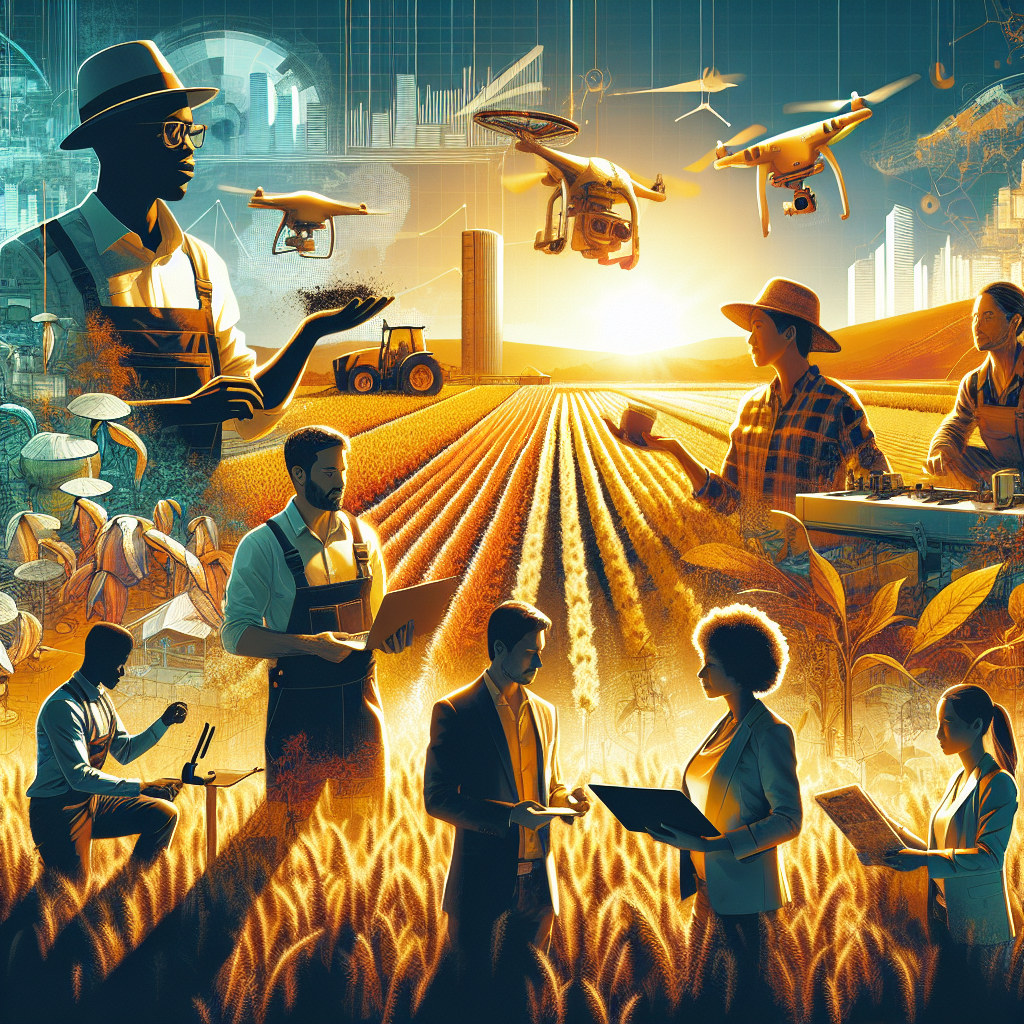Agrawau Revolutionizing Sustainable Agriculture for the Future
In the rapidly evolving world of agriculture, agrawau stands out as a beacon of innovation and sustainability. This blog post dives into the multifaceted impact of agrawau on modern farming practices. Agricultural professionals, sustainable farming enthusiasts, and agtech innovators will find valuable insights here, helping them understand how agrawau can revolutionize their approach to farming.
What is Agrawau?
Agrawau refers to a suite of advanced agricultural technologies and practices designed to make farming more efficient, sustainable, and profitable. By integrating cutting-edge tools like AI, IoT, and data analytics, agrawau helps farmers optimize resources, reduce waste, and boost crop yields. This holistic approach ensures that every aspect of farming—from soil management to crop harvesting—is handled with precision and care.
Understanding agrawau is crucial for anyone involved in agriculture today. With climate change and population growth putting unprecedented pressure on food systems, sustainable solutions are more important than ever. It offers a way to meet these challenges head-on, providing farmers with the tools they need to thrive in a changing world. Whether you’re a seasoned professional or a newcomer to the field, agrawau has something to offer.
The beauty of it lies in its versatility. It can be applied to various types of farming, from small organic farms to large industrial operations. By leveraging technology to streamline processes and improve outcomes, agrawau makes it easier for farmers to achieve their goals. In the sections that follow, we will explore the many ways agrawau is transforming agriculture and paving the way for a more sustainable future.
The Importance of Sustainable Agriculture
Sustainable agriculture is not just a buzzword; it’s a necessity. It plays a critical role in promoting sustainable farming practices that protect the environment and ensure long-term viability. By reducing reliance on chemical fertilizers and pesticides, agrawau helps maintain soil health and biodiversity. This, in turn, leads to healthier crops and a more resilient ecosystem.
One of the key benefits of sustainable agriculture is its ability to conserve resources. It’s technologies like precision irrigation and automated monitoring systems allow farmers to use water and energy more efficiently. This not only reduces costs but also minimizes the environmental impact of farming activities. For agricultural professionals, adopting agrawau means staying ahead of regulatory changes and consumer demands for eco-friendly practices.
Sustainable agriculture also enhances food security by making farming more resilient to climate change. Agrawau tools can predict weather patterns and provide real-time data on soil and crop conditions, helping farmers make informed decisions. This proactive approach reduces the risk of crop failure and ensures a stable food supply. For sustainable farming enthusiasts and agtech innovators, agrawau represents a significant step forward in creating a more equitable and sustainable food system.
How Agrawau Enhances Crop Yield
One of the primary goals of agrawau is to increase crop yield without compromising quality or environmental integrity. By utilizing advanced analytics and machine learning, agrawau can identify the optimal conditions for plant growth. This includes everything from soil pH levels to nutrient requirements. With this data, farmers can make precise adjustments to ensure their crops receive exactly what they need to thrive.
Agrawau’s focus on efficiency extends to pest and disease management. Traditional methods often involve blanket applications of pesticides, which can harm beneficial insects and lead to resistance. Agrawau offers targeted solutions that identify specific threats and address them with minimal collateral damage. This approach not only protects crops but also preserves the surrounding ecosystem.
Another way it boosts crop yield is through improved seed selection. By analyzing historical data and current conditions, agrawau can recommend the best varieties for a given location. This personalized approach ensures that farmers are planting crops that are well-suited to their environment, increasing the likelihood of a successful harvest. For agricultural professionals looking to maximize their output, agrawau provides invaluable insights and tools.
The Role of IoT in Agrawau
The Internet of Things (IoT) is a cornerstone of the agrawau framework. IoT devices collect real-time data on various aspects of farming, from soil moisture levels to weather conditions. This data is then analyzed to provide actionable insights that help farmers optimize their operations. By integrating IoT into their practices, farmers can monitor their crops and livestock remotely, ensuring timely interventions when needed.
One of the significant advantages of IoT in it is its ability to provide continuous monitoring. Sensors placed throughout the farm can track various parameters and send alerts if something is amiss. This real-time feedback loop allows farmers to address issues before they become critical, reducing the risk of crop failure or livestock illness. For sustainable farming enthusiasts, IoT represents a powerful tool for maintaining balance and harmony within the farm ecosystem.
IoT also facilitates better resource management. Smart irrigation systems, for example, can adjust watering schedules based on real-time data, ensuring that crops receive the right amount of water at the right time. This not only conserves water but also promotes healthier plant growth. Agtech innovators will find that incorporating IoT into their solutions can significantly enhance the effectiveness and sustainability of their offerings.
AI and Machine Learning in Agrawau
Artificial Intelligence (AI) and Machine Learning (ML) are transforming the landscape of agriculture, and agrawau is at the forefront of this revolution. These technologies enable predictive analytics, allowing farmers to anticipate challenges and opportunities before they arise. By analyzing large datasets, AI can identify patterns and trends that human eyes might miss, offering deeper insights into crop performance and resource utilization.
One of the key applications of AI in it is in yield prediction. Machine learning algorithms can analyze historical data and current conditions to forecast crop yields with high accuracy. This information helps farmers plan their planting and harvesting schedules more effectively, ensuring that they maximize their output. For agricultural professionals, leveraging AI means staying competitive in an increasingly data-driven industry.
AI also plays a crucial role in precision agriculture. By combining data from multiple sources, including satellites, drones, and ground sensors, AI can create detailed maps of farm fields. These maps highlight areas that require attention, such as nutrient deficiencies or pest infestations. Farmers can then take targeted actions, improving the overall health and productivity of their crops. Sustainable farming enthusiasts will appreciate how AI-driven precision agriculture minimizes waste and reduces the environmental impact of farming.

Data Analytics and Its Impact on Agrawau
Data analytics is a powerful tool in the agrawau arsenal, enabling farmers to make informed decisions based on empirical evidence. By collecting and analyzing data on various aspects of farming, from soil quality to crop performance, It provides a comprehensive understanding of what works and what doesn’t. This data-driven approach ensures that resources are used efficiently, maximizing both yield and sustainability.
One of the significant benefits of data analytics in it is its ability to identify trends and anomalies. For example, by analyzing weather patterns and historical crop data, farmers can predict potential challenges and take proactive measures. This foresight reduces the risk of crop failure and ensures a stable food supply. For agtech innovators, incorporating data analytics into their solutions can significantly enhance their effectiveness and appeal to modern farmers.
Data analytics also facilitates continuous improvement. By tracking the performance of different farming practices and comparing them against each other, farmers can identify best practices and areas for improvement. This iterative approach ensures that farming operations are continually optimized, leading to better outcomes over time. Agricultural professionals will find that adopting a data-driven mindset can significantly enhance their productivity and sustainability.
Agrawau in Supply Chain Management
Efficient supply chain management is critical for the success of any agricultural operation, and agrawau offers several solutions to streamline this process. From farm to fork, agrawau technologies ensure that every step of the supply chain is optimized for efficiency and sustainability. This includes everything from inventory management to transportation logistics, ensuring that products reach consumers in the best possible condition.
One of the key benefits of it in supply chain management is its ability to provide real-time visibility. By integrating IoT and data analytics, farmers and distributors can track the movement of goods at every stage of the supply chain. This transparency reduces the risk of delays and ensures that products are delivered on time. For sustainable farming enthusiasts, a well-managed supply chain means less waste and a smaller carbon footprint.
Agrawau also enhances traceability, which is increasingly important in today’s market. Consumers want to know where their food comes from and how it was produced. Agrawau technologies enable detailed record-keeping, allowing farmers to provide this information with ease. This transparency builds trust with consumers and can lead to higher market prices for sustainably produced goods. Agtech innovators will find that incorporating supply chain solutions into their offerings can create significant value for their customers.
Marketing and Consumer Engagement with Agrawau
In the age of conscious consumerism, engaging with customers about sustainable practices is more important than ever. Agrawau provides several tools to help farmers market their products effectively and build strong relationships with their customers. By highlighting the sustainable practices enabled by agrawau, farmers can differentiate their products and appeal to eco-conscious consumers.
One of the key marketing strategies for agrawau is storytelling. Farmers can share the story of how their products are grown and processed, emphasizing the role of agrawau in promoting sustainability. This narrative can be shared through various channels, including social media, websites, and packaging. For agricultural professionals, storytelling is a powerful way to connect with consumers and build brand loyalty.
Agrawau also facilitates direct consumer engagement. Technologies like QR codes and blockchain can provide detailed information about the origin and production of products. Consumers can scan a code on the packaging to learn about the farm, the farming practices used, and the sustainability initiatives in place. This transparency builds trust and can lead to repeat business. Sustainable farming enthusiasts will appreciate the opportunity to showcase their commitment to environmental stewardship.
Challenges and Solutions in Implementing Agrawau
While agrawau offers numerous benefits, implementing these technologies is not without its challenges. One of the primary obstacles is the initial cost of investment. High-tech solutions can be expensive, and small-scale farmers may struggle to afford them. However, there are several ways to mitigate these costs, such as government grants, subsidies, and cooperative purchasing agreements.
Another challenge is the learning curve associated with new technologies. Farmers may need training and support to effectively use agrawau tools. This can be addressed through partnerships with agtech companies, which often provide training and technical support. For agtech innovators, focusing on user-friendly design and robust customer support can help ease the transition for farmers.
Data privacy and security are also concerns when implementing agrawau. Farmers need to ensure that their data is protected from unauthorized access and breaches. This requires robust cybersecurity measures and compliance with relevant regulations. Agricultural professionals can work with trusted technology providers to ensure that their data is secure and used responsibly.

The Future of Agrawau
The future of agrawau is bright, with continuous advancements in technology and increasing awareness of the importance of sustainable farming. As AI, IoT, and data analytics continue to evolve, agrawau will become even more powerful and accessible. This will enable farmers of all sizes to benefit from these innovations, driving a global shift towards more sustainable agricultural practices.
One of the exciting developments on the horizon is the integration of blockchain technology into agrawau. Blockchain can enhance transparency and traceability, providing an immutable record of every step in the farming process. This can build trust with consumers and reduce fraud, ensuring that sustainably produced goods are accurately represented in the market.
Another promising area is the development of autonomous farming equipment. Drones, robots, and autonomous tractors can perform tasks with precision and efficiency, reducing the need for manual labor and minimizing human error. For sustainable farming enthusiasts, these technologies offer new ways to reduce the environmental impact of farming and improve productivity.
Conclusion
Agrawau is revolutionizing sustainable agriculture, offering innovative solutions that enhance efficiency, productivity, and environmental stewardship. From AI and IoT to data analytics and supply chain management, agrawau provides a comprehensive suite of tools that cater to the diverse needs of modern farmers. Whether you’re an agricultural professional, a sustainable farming enthusiast, or an agtech innovator, agrawau has something to offer.
By adopting agrawau technologies, farmers can achieve better outcomes while reducing their environmental impact. These tools enable precise resource management, enhance decision-making, and promote transparency, building trust with consumers. The future of agriculture lies in sustainability, and agrawau is leading the way.
If you’re ready to take your farming practices to the next level, explore the possibilities of agrawau today. By leveraging these advanced technologies, you can create a more sustainable and profitable future for your farm. Join the agrawau revolution and be part of the solution.














Post Comment